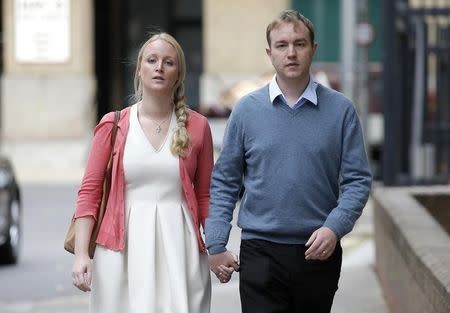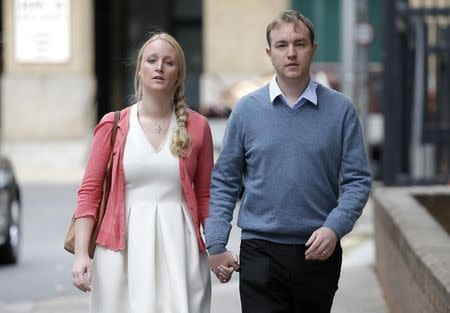Jailed Libor trader Hayes denied fair trial, lawyer tells London appeals court
By Kirstin Ridley
LONDON (Reuters) - The judge who sentenced Tom Hayes to 14 years in jail for conspiracy to rig Libor interest rates blocked the defence from presenting key evidence about a banking industry that routinely flouted rules, his lawyer told an appeals court on Tuesday.
On the first day of a two-day appeal against the former trader's conviction and sentence, lawyer Neil Hawes told senior judges at London's Court of Appeal that the jury should have been free to consider if Hayes had acted dishonestly against the backdrop of industry practice at the time.
Hayes, a 36-year-old former UBS and Citigroup trader, was found guilty in August of eight charges of conspiracy to defraud for rigging Libor, the London interbank offered rate that underpins around $450 trillion (£298 trillion) of financial contracts and consumer loans worldwide.
Hawes said that during his closing speech in the trial, Judge Jeremy Cooke had prevented him from referring the jury to the culture of the industry in 2006-2010, when he said banks routinely tried to influence benchmark interest rates for commercial reasons.
Quizzed by Lord Chief Justice John Thomas, the head of the judiciary in England and Wales, as well as Brian Leveson and Elizabeth Gloster, Hawes denied his argument hinged on bankers having their own standards of honesty.
"In judging standards of reasonable and honest people, you have to have regard to the conduct of the market (at the time)," he said.
DISHONESTY TEST
Hayes, whose lawyers are arguing Cooke made legal errors in the way he handled the trial and that the sentence was wrong in principle and/or excessive, waived his right to attend a dry hearing that focussed in part on the objective and subjective definition of dishonesty -- the so-called Ghosh test.
Under the test, a jury has to decide whether a defendant acted dishonestly according to ordinary standards of reasonable and honest people. If so, it must consider whether the defendant realised what he was doing was dishonest by those standards.
Asked by Judge Thomas whether Hawes's argument appeared to suggest "diluting" the standards of honesty by reference to the market, prosecutor Mukul Chawla said: "That is the effect of what is now suggested."
Hayes, a former Tokyo-based yen derivatives trader diagnosed with Asperger's Syndrome, denied dishonesty during his trial, arguing he had been open about practices which he said were endorsed by senior staff and common in the industry at the time.
But his defence was complicated by previous admissions of dishonesty, described by the prosecution on Tuesday as direct, indirect and qualified, while initially cooperating with the Serious Fraud Office (SFO) in 2013 before Hayes said rage drove him to pull out of the agreement and fight the charges.
Hawes said Cooke had also wrongly refused to admit heresay evidence about how one broker ignored Hayes' requests to help move Libor rates to his trading advantage or that a "permissible range" of Libor submissions existed - casting doubt, Hawes said, on the prosecution case that Hayes had struck a dishonest agreement with the unnamed broker.
Equally, he said Hayes was denied access to his former profit and loss accounts, which could have helped him counter allegations that he was "obsessed" with making a profit.
Finally, Hawes said Judge Cooke erred when he ruled that expert medical evidence was irrelevant about Hayes's depression in late 2012 and 2013 after he was charged by both U.S. and British prosecutors.
"I'm not surprised he felt depressed," noted Judge Leveson. "We're not suggesting it was a mental illness he was suffering, are we?". Hawes said "it didn't go that far."
(Editing by Mark Potter and Susan Fenton)




